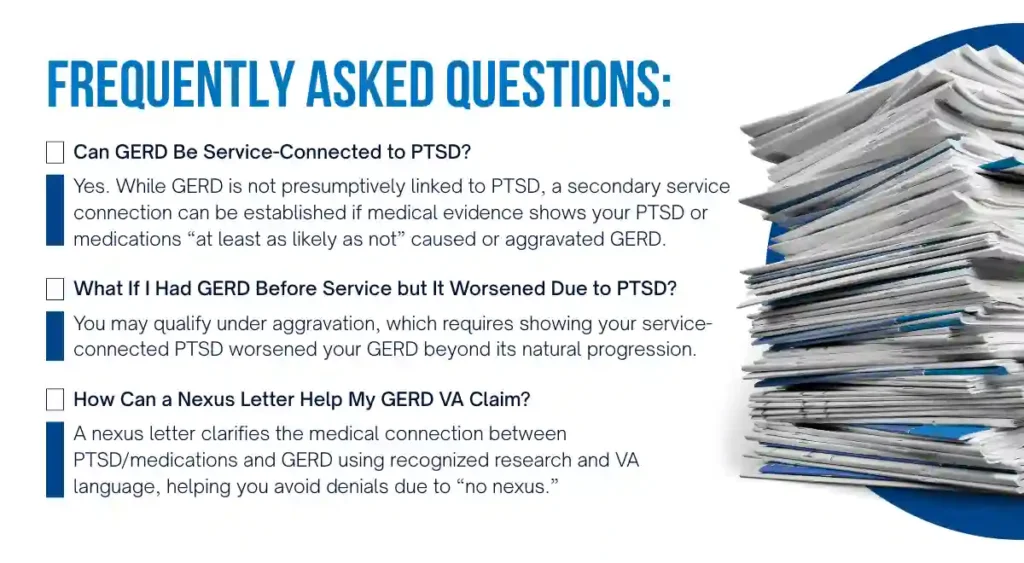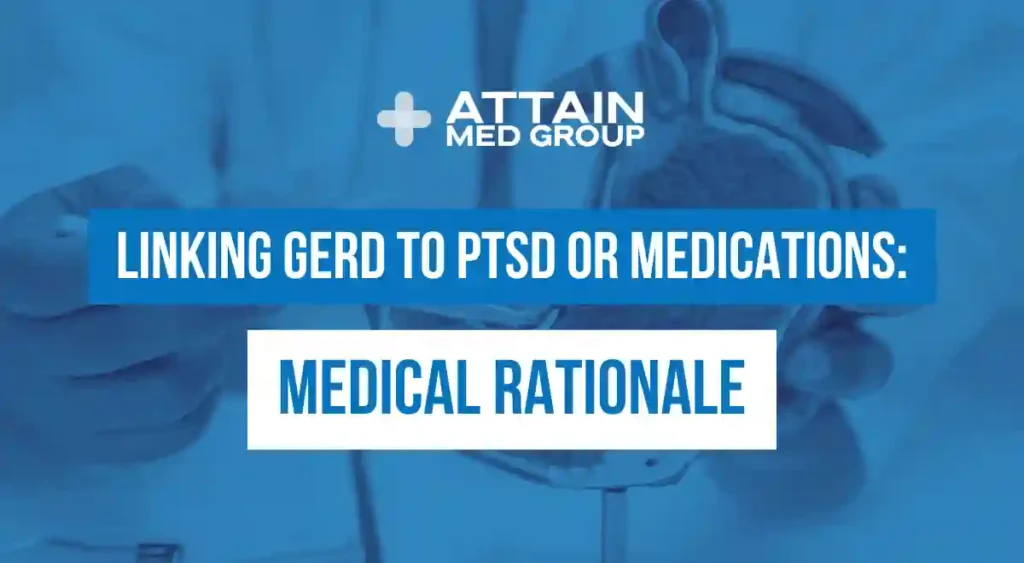Many veterans with post-traumatic stress disorder (PTSD) also struggle with gastroesophageal reflux disease (GERD). However, the VA often denies GERD claims unless there is clear medical evidence linking it to service or to a service-connected condition like PTSD or medications prescribed for PTSD.
This guide explains:
✅ How GERD can be secondary to PTSD or medications.
✅ Medical research supporting the connection.
✅ How to build a strong claim with a nexus letter for GERD secondary to PTSD or medications.
By understanding the medical rationale and evidence required, you can avoid unnecessary denials and secure the VA disability benefits you deserve.

What Is GERD, and Why Is It Common in Veterans with PTSD?
GERD occurs when stomach acid frequently flows back into the esophagus, causing:
- Heartburn
- Regurgitation
- Chest pain
- Difficulty swallowing
Veterans with PTSD are at increased risk of GERD due to chronic stress, hyperarousal, and medications used to manage PTSD symptoms. The VA does not automatically grant service connection for GERD, requiring veterans to establish a medical nexus showing GERD is caused or aggravated by PTSD or medications.

1️⃣ Stress and Hyperarousal
- PTSD activates the sympathetic nervous system (“fight or flight”), leading to increased stomach acid production and delayed gastric emptying.
- Chronic hyperarousal can weaken the lower esophageal sphincter (LES), allowing acid to reflux into the esophagus.
2️⃣ Behavioral Factors
- PTSD may lead to smoking, alcohol use, and poor diet, all of which are risk factors for GERD.
- Sleep disturbances common in PTSD can increase nighttime reflux.

Many medications used to manage PTSD, anxiety, and depression can contribute to GERD, including:
- SSRIs (e.g., sertraline, fluoxetine): May increase acid production or reduce LES tone.
- Benzodiazepines (e.g., clonazepam): Can relax the LES, allowing acid reflux.
- Antipsychotics and mood stabilizers: May slow gastric emptying, increasing reflux risk.
A 2020 study in Current Treatment Options in Gastroenterology noted that psychotropic medications are commonly associated with GERD symptoms.
If you are taking PTSD medications and develop GERD symptoms, this may support a secondary service connection claim.

Research Supporting the GERD-PTSD Connection (TITLE)
Medical studies supporting GERD secondary to PTSD include:
✅ Journal of Neurogastroenterology and Motility (2017): Stress is a significant factor in GERD pathogenesis, with PTSD patients experiencing higher GERD rates.
✅ Digestive Diseases and Sciences (2018): Veterans with PTSD have increased GERD prevalence due to physiological and behavioral factors.
✅ VA Research Currents (2019): Veterans with PTSD on chronic psychotropic medications show higher rates of gastrointestinal issues, including GERD.
Referencing these studies in your nexus letter can strengthen your claim.
Why Nexus Letters Are Critical in GERD VA Claims
A nexus letter from an independent medical provider can bridge the gap between your GERD diagnosis and your service-connected PTSD or medications.
A strong nexus letter should:
✅ Reference your medical and service records.
✅ Use VA-compliant language such as “at least as likely as not.”
✅ Cite recognized medical studies and pathways showing how PTSD or medications contribute to GERD.
✅ Clarify if PTSD aggravated pre-existing GERD, supporting an aggravation-based claim.
Without a clear nexus letter, your claim may be denied for “no service connection,” regardless of your GERD severity.

Many veterans face unnecessary denials or low ratings for GERD claims because they overlook critical evidence or fail to link GERD to PTSD and medications properly. Understanding these common mistakes can help you avoid delays, denials, and appeals in your VA claim process.
❌ Relying on GERD Symptoms Alone Without a Confirmed Diagnosis
The VA does not grant disability benefits based on symptoms alone. Even if you experience heartburn, regurgitation, or chest discomfort, you must have a current, medical provider-confirmed diagnosis of GERD to be eligible for VA compensation.
Action Step:
- Request a medical evaluation with your primary care provider or gastroenterologist.
- Ensure GERD is documented in your medical records, not just noted as “acid reflux” or “heartburn.”
❌ Failing to Document PTSD Medications That May Contribute to GERD
Many veterans take SSRIs, benzodiazepines, and other medications for PTSD that can weaken the lower esophageal sphincter or increase stomach acid production, leading to GERD. If you do not document these medications, the VA may miss the connection between your PTSD treatment and your GERD.
Action Step:
- Create a medication list showing the start date and dosage of each PTSD medication.
- Record when GERD symptoms began in relation to medication use.
- Keep pharmacy records as additional proof for your claim.
❌ Not Providing a Nexus Letter Explicitly Linking GERD to PTSD or Medications
A nexus letter is often the missing piece in GERD claims. Even with a GERD diagnosis and documented PTSD, the VA needs clear medical evidence linking the two. Without a nexus letter, your claim may be denied for “no service connection.”
Action Step:
- Secure a VA-compliant nexus letter from an experienced independent medical provider.
- Ensure the letter states that your GERD is “at least as likely as not” caused or aggravated by your PTSD or medications.
- The letter should reference your medical records and cite credible research supporting the PTSD-GERD link.
❌ Not Explaining Lifestyle Factors Related to PTSD That May Have Contributed to GERD
PTSD often leads to lifestyle factors that increase GERD risk, such as:
- Smoking
- Alcohol use
- Poor diet
- Sleep disruptions
If your lifestyle changes due to PTSD contributed to GERD, the VA can consider these factors for secondary service connection, but you must explain and document them clearly.
Action Step:
- Provide statements explaining how PTSD symptoms affected your habits (e.g., increased smoking or poor eating patterns due to anxiety).
- Submit lay statements from family or friends supporting changes in your lifestyle linked to PTSD.
- Include this context in your nexus letter to strengthen your claim.
Why Avoiding These Mistakes Matters
By addressing these common errors:
✅ You increase your chances of approval on the first submission.
✅ You avoid unnecessary appeals and delays.
✅ You strengthen your case for accurate back pay.
✅ You reduce stress and uncertainty while navigating the VA claims process.
Avoiding these mistakes will improve your chances of claim approval and correct rating.

Building a Strong GERD VA Claim Secondary to PTSD
Winning your VA claim for GERD secondary to PTSD requires clear, well-organized medical evidence and a VA-compliant strategy. The VA will not automatically connect GERD to PTSD or your medications, so it’s your responsibility to build a clear, evidence-supported case.
Here’s how to strengthen your GERD VA claim step-by-step:
✅ Obtain a Current GERD Diagnosis Confirmed by Your Doctor or a VA Provider
The VA does not compensate for symptoms alone (heartburn, acid reflux, or regurgitation). You must have:
- A formal GERD diagnosis documented in your medical records.
- Ideally, diagnostic tests such as endoscopy, pH monitoring, or upper GI studies confirming GERD.
Why this matters: Without a current, documented diagnosis, your claim will likely be denied at the initial stage.
Action Steps:
- Schedule an evaluation with your VA provider or a private gastroenterologist.
- Request that your diagnosis is explicitly documented as “gastroesophageal reflux disease (GERD).”
- Retain copies of your medical records for your claim file.
✅ Document Your PTSD Medications and the Timeline of GERD Symptom Onset
Many PTSD medications, including SSRIs, SNRIs, benzodiazepines, and antipsychotics, can contribute to GERD by:
- Increasing stomach acid production.
- Relaxing the lower esophageal sphincter.
- Delaying gastric emptying.
Connecting your GERD to these medications strengthens your secondary claim.
Action Steps:
- Create a medication log with drug names, dosages, and start dates.
- Note when GERD symptoms began and whether they worsened with specific medications.
- Obtain pharmacy printouts to confirm prescription history.
✅ Gather Medical Research and Studies Linking PTSD/Medications to GERD
The VA requires credible medical rationale to support secondary claims. Citing peer-reviewed studies that demonstrate how PTSD or PTSD-related medications contribute to GERD will enhance your nexus letter and your overall claim.
Relevant studies to reference:
- Journal of Neurogastroenterology and Motility (2017): Links stress/PTSD to GERD pathogenesis.
- Digestive Diseases and Sciences (2018): Shows increased GERD prevalence among veterans with PTSD.
- VA Research Currents (2019): Notes higher gastrointestinal issues, including GERD, in veterans on psychotropic medications.
Action Steps:
- Provide your medical provider with these studies when requesting your nexus letter.
- Include these references in your VA claim narrative to demonstrate your understanding of the medical connection.
✅ Secure a Clear, VA-Compliant Nexus Letter from an Independent Medical Provider
A nexus letter is often the key to winning secondary GERD claims. This letter should:
- Directly connect your GERD to your PTSD or medications using the “at least as likely as not” standard.
- Reference your medical and service records, including PTSD diagnosis, medications, and GERD documentation.
- Cite credible medical pathways and peer-reviewed research supporting the PTSD-GERD or medication-GERD link.
- Clarify if GERD was aggravated by PTSD or its treatment, supporting aggravation-based claims.
Why this matters: The nexus letter fills the gap between your diagnosis and service connection, preventing denials for “no nexus.”
Action Steps:
- Contact Attain Med Group to obtain an independent, VA-compliant nexus letter backed by medical evidence.
- Ensure your nexus letter addresses both direct causation and aggravation if applicable.

Why This Strategy Matters
By following these steps:
✅ You strengthen your claim with evidence the VA recognizes.
✅ You reduce your risk of denials and lengthy appeals.
✅ You maximize your potential for back pay and fair compensation.
✅ You bring clarity and confidence to your VA claim process.

Secure the Benefits You Deserve
GERD secondary to PTSD or medications is a valid VA claim, but requires clear, credible medical evidence and a well-supported nexus letter to succeed.
Attain Med Group specializes in crafting VA-compliant nexus letters backed by credible research, helping veterans secure the benefits they deserve for GERD secondary to PTSD.
Ready to Strengthen Your GERD VA Claim?
✅ Contact Attain Med Group today for a consultation on obtaining a GERD-PTSD nexus letter.
✅ Download our Free GERD Claim Preparation Checklist to organize your medical evidence.
✅ Get expert support from the most trusted name in medical evidence for VA claims.


